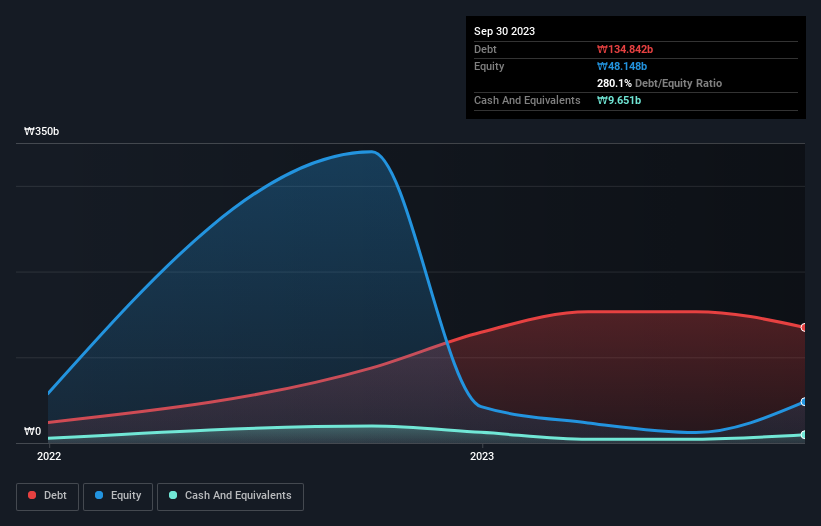- South Korea
- /
- Food
- /
- KOSDAQ:A016790
CANARIABIO (KOSDAQ:016790) Has Debt But No Earnings; Should You Worry?

Some say volatility, rather than debt, is the best way to think about risk as an investor, but Warren Buffett famously said that 'Volatility is far from synonymous with risk.' When we think about how risky a company is, we always like to look at its use of debt, since debt overload can lead to ruin. We note that CANARIABIO Inc. (KOSDAQ:016790) does have debt on its balance sheet. But should shareholders be worried about its use of debt?
What Risk Does Debt Bring?
Debt assists a business until the business has trouble paying it off, either with new capital or with free cash flow. Part and parcel of capitalism is the process of 'creative destruction' where failed businesses are mercilessly liquidated by their bankers. However, a more usual (but still expensive) situation is where a company must dilute shareholders at a cheap share price simply to get debt under control. By replacing dilution, though, debt can be an extremely good tool for businesses that need capital to invest in growth at high rates of return. When we examine debt levels, we first consider both cash and debt levels, together.
See our latest analysis for CANARIABIO
What Is CANARIABIO's Debt?
You can click the graphic below for the historical numbers, but it shows that as of September 2023 CANARIABIO had ₩134.8b of debt, an increase on ₩87.7b, over one year. However, because it has a cash reserve of ₩9.65b, its net debt is less, at about ₩125.2b.

How Healthy Is CANARIABIO's Balance Sheet?
Zooming in on the latest balance sheet data, we can see that CANARIABIO had liabilities of ₩185.1b due within 12 months and liabilities of ₩40.1b due beyond that. Offsetting this, it had ₩9.65b in cash and ₩43.8b in receivables that were due within 12 months. So its liabilities total ₩171.7b more than the combination of its cash and short-term receivables.
When you consider that this deficiency exceeds the company's ₩171.3b market capitalization, you might well be inclined to review the balance sheet intently. In the scenario where the company had to clean up its balance sheet quickly, it seems likely shareholders would suffer extensive dilution. There's no doubt that we learn most about debt from the balance sheet. But you can't view debt in total isolation; since CANARIABIO will need earnings to service that debt. So if you're keen to discover more about its earnings, it might be worth checking out this graph of its long term earnings trend.
In the last year CANARIABIO wasn't profitable at an EBIT level, but managed to grow its revenue by 19%, to ₩170b. We usually like to see faster growth from unprofitable companies, but each to their own.
Caveat Emptor
Over the last twelve months CANARIABIO produced an earnings before interest and tax (EBIT) loss. To be specific the EBIT loss came in at ₩11b. Considering that alongside the liabilities mentioned above make us nervous about the company. It would need to improve its operations quickly for us to be interested in it. Not least because it had negative free cash flow of ₩47b over the last twelve months. So suffice it to say we consider the stock to be risky. There's no doubt that we learn most about debt from the balance sheet. However, not all investment risk resides within the balance sheet - far from it. Be aware that CANARIABIO is showing 3 warning signs in our investment analysis , and 2 of those are potentially serious...
If, after all that, you're more interested in a fast growing company with a rock-solid balance sheet, then check out our list of net cash growth stocks without delay.
New: AI Stock Screener & Alerts
Our new AI Stock Screener scans the market every day to uncover opportunities.
• Dividend Powerhouses (3%+ Yield)
• Undervalued Small Caps with Insider Buying
• High growth Tech and AI Companies
Or build your own from over 50 metrics.
Have feedback on this article? Concerned about the content? Get in touch with us directly. Alternatively, email editorial-team (at) simplywallst.com.
This article by Simply Wall St is general in nature. We provide commentary based on historical data and analyst forecasts only using an unbiased methodology and our articles are not intended to be financial advice. It does not constitute a recommendation to buy or sell any stock, and does not take account of your objectives, or your financial situation. We aim to bring you long-term focused analysis driven by fundamental data. Note that our analysis may not factor in the latest price-sensitive company announcements or qualitative material. Simply Wall St has no position in any stocks mentioned.
About KOSDAQ:A016790
Weak fundamentals or lack of information.
Market Insights
Community Narratives



